
When Camden Yards opened in Baltimore in 1992, baseball changed forever.
Baseball architecture and ball-park aesthetic were transformed. Retro design touches were in. "Modern" multi-purpose, artificial-surface stadiums of the 1970s and '80s were out.
Camden Yards was so revolutionary that even a brand-new facility like the new Comiskey Park, which the White Sox debuted in 1991, felt outdated.
Every MLB team saw the need to create their own version of Camden Yards- and many did. In the 15 years between 1992 and 2006, a total of 14 new ballparks opened, nearly all of them with borrowed ideas from Camden Yards.
That building spree was nearly unprecedented in MLB history. In the 17 years since then, just seven MLB ballparks have been built. Only the Braves and Rangers have opened new parks in the past decade.
It's hard to find an independent economist who will agree that publicly funded stadiums drive larger revenue gains than the stadium costs themselves. Still, the sales pitch of the value of a publicly funded stadium has proved effective time and time again for baseball teams, in part because it appealed to the team's fans.
It was clear that the fan experience at a brand-new facility like Camden Yards was preferable to attending games at Veterans Stadium or Candlestick Park or Three Rivers Stadium.
As we head into the mid-2020s, what is apparent is that the opening of Truist Park in Atlanta may prove in the long run to be as significant to MLB owners as the unveiling of Camden Yards.
Esta historia es de la edición September 2023 de Baseball America.
Comience su prueba gratuita de Magzter GOLD de 7 días para acceder a miles de historias premium seleccionadas y a más de 9,000 revistas y periódicos.
Ya eres suscriptor ? Conectar
Esta historia es de la edición September 2023 de Baseball America.
Comience su prueba gratuita de Magzter GOLD de 7 días para acceder a miles de historias premium seleccionadas y a más de 9,000 revistas y periódicos.
Ya eres suscriptor? Conectar
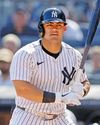
THE SERVICE TIME CONUNDRUM
MLB’s byzantine service time rules cloud rookie status and now PPI eligibility

LUIS TIANT WAS MLB'S MOST SUCCESSFUL CUBAN PITCHER
On a scouting trip to Cuba in 1957, Bobby Avila discovered 16-year-old righthander Luis Tiant on the island's Juvenile League all-star team.

ORGANIZATION REPORT
Outfielder Heston Kjerstad's career has been unique, to say the least.

TOP 10 NL EAST
From the moment Thomas White stepped on a high school mound, he was viewed as the top lefthander available in the 2023 draft.
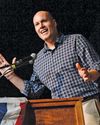
PREPARATION PAYS OFF
lowa politician J.D. Scholten makes a surprising return to pro ball at age 44

MAKING THE GRADE
Assessing the future value of graduated National League prospects
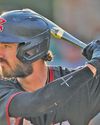
TOP 10 NL WEST
Even in high school, Bryce Eldridge could hit the ball a mile. The 6-foot-7 righthander could also touch 96 mph off the mound.
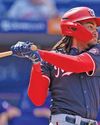
Wood Has Towering Upside- Nationals rookie James Wood also stands 6-foot-7 and also has game-changing power.
Aaron Judge and Oneil Cruz are 6-foot7 sluggers who stand out for their power in this year’s MLB Best Tools voting. Wood spent half of this season with Triple-A Rochester before making his MLB debut on July 1. While he was in the International League, he captured managers’ attention. Wood unanimously won Best Power Prospect and also claimed Most Exciting Player in a survey of league skippers. Wood hit .353/.463/.595 with 10 home runs in 52 games for Rochester. His .242 isolated slugging was the best for a player 21 or younger at Triple-A this season.
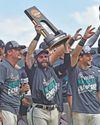
ROAD BLOCK?
Scholarship expansion puts mid-majors at a major disadvantage on the road to Omaha

ROYALS REVIVAL
A revamped and rejuvenated farm system has Kansas City ready to rebound